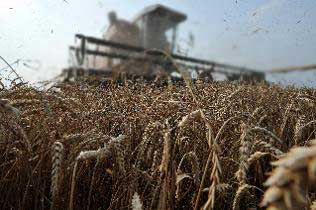Russia’s feed wheat prices to hit new highs in 2013

Finishing this year with more than 75% gain, Russian feed wheat prices are expected to reach new highs this year due to tight supply and worsening prospects for the 2013 winter crops. “Farmers are in no hurry to sell their grain which is the main factor behind the expectations for higher 2013 prices”, reports analysts from the analytical agency SovEcon.
Fifth-grade feed wheat rose RUB300 (US$10) to RUB10,850 (US$356) per tonne in the last week of 2012. Almost a year ago third-grade wheat was RUB6,400 (US$210) per tonne, while fourth-grade was pegged at RUB6,300 (US$207) per tonne. As for export prices, demand for relatively expensive Russian wheat remained weak last week, making potential export difficulties caused by tough weather conditions less important.
This winter’s grain harvest may be hurt by cold weather with a lack of snow in some parts of Russia’s “bread basket” regions, according to SovEcon. The percentage of plantings, deemed to be in a poor state, does not exceed 8-9% as of now, Russia’s Deputy Prime Minister Arkady Dvorkovich said. Last week, average domestic EXW (ex-silo) prices in the European part of the country for third-grade and fourth-grade milling wheat rose RUB350 (US$11.5) to reach RUB11,250 (US$360) per tonne each, according to SovEcon.
Deteriorating weather conditions for winter crops are also not helping as it may increase demand for seeds needed for crops re-sowing during the spring,” it added. Russia, historically one of largest wheat exporters, was hit by unfavourable weather during 2011-12 winter and by drought in spring of 2012, severely depleting grain stocks, sending domestic wheat prices to record highs and raising fears of a spring deficit.
Besides Russian farmers are already facing a feed grain shortage, according to the Agriculture Ministry. In Russia’s north-west there is only 82.3% of the required feed, in the south stocks stand at 87%, North Caucasus at 91.2%, the Volga region at 83.6%, Siberia at 72.1%, the Urals at 92.2%, and the Far East at 83.2%. Farmers must buy an extra 1.5 million tonnes of feed grain to cover the deficit, the report added.







